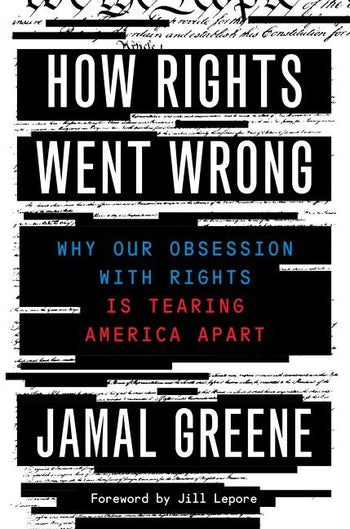Jamal Greene’s new book, How Rights Went Wrong, renovates and updates Glendon’s indictment of American “rightsism” since the 1960s, with its own glances abroad for a better way. Now a highly regarded professor at Columbia Law School, Greene worked for Sports Illustrated before going to law school, and his writing makes the human stakes of otherwise abstract legal choices clear and dramatic (and with lots of good snark to lighten the mood).
Whereas Glendon ranged across many areas of law, Greene focuses on America’s constitutional law. In his version, the Supreme Court needed to affirm strong rights to end Jim Crow, but sharpened this need into a universal model that made some rights sacrosanct while putting others in the shade. The highest court played an indispensable role in ending some forms of vicious white supremacy in Brown and criminal justice cases, by destroying “separate but equal” institutions and affording defendants rights against overzealous policing and prosecution. But by the same token, a range of other desirable values, notably welfare entitlements, was given no judicial protection.
The main reason, Greene explains, was overreaction to the Supreme Court’s “defining mistake” in the period between America’s founding and the civil rights era. The Constitution got captured by ideologies of economic freedom in the late nineteenth and early twentieth centuries. Lochner v. New York (1905), most notably, read a right to freedom of contract unmolested by the state into America’s fundamental law, in order to invalidate government regulation of working hours and workplace safety. In response, Greene shows, jurists like Supreme Court Justice Oliver Wendell Holmes and especially his self-appointed progressive heir and later Justice Felix Frankfurter tried to restrict constitutional protection to a few nonnegotiable rights, and get the Constitution out of the way otherwise. The results were to allow African Americans in the civil rights era and other minorities later to use the Constitution as a sword against majorities oppressing them, while keeping business interests from adopting it as a shield against majority rule.
In Greene’s telling, this “discriminating” approach to rights, magnifying a few and negating most, was a calamity. It made sense to fortify rights as a battering ram to breach the walls of Jim Crow, while making sure that economically progressive legislation survived the assertion of rights of business interests. But in the long run, he argues, this “two-track” approach has been “completely inadequate, even dangerous.” Judges picked some winners of the sweepstakes in free speech, personal autonomy, and private property cases, and awarded them strong rights; but most people lost.
